Key takeaways:
- Reparations are not solely financial; they involve acknowledgment of historical injustices and can promote healing and dignity.
- Historical documentaries create emotional connections and challenge prevailing narratives, fostering critical discussions around reparations.
- Grassroots mobilization and inclusive dialogue are crucial for effective reparations advocacy, bringing diverse voices into the conversation.
- Storytelling in documentaries can inspire activism by making complex issues relatable and highlighting personal experiences of injustice.

Understanding reparations politics
Understanding reparations politics requires unpacking a complex tapestry of historical injustices and their ongoing impacts. I remember feeling a surge of emotion while watching a documentary that highlighted the lasting scars of colonialism—how these pasts shape the present. It made me wonder: how can societies truly heal when the echoes of their history linger so powerfully?
As I delved deeper into the topic, I realized that reparations are not just financial compensations but also signify a formal acknowledgment of wrongs committed. When I heard personal stories from descendants of enslaved individuals, it struck me that these reparations could foster not only economic recovery but also a sense of dignity and recognition. Isn’t it critical to consider how reparative measures can transform attitudes towards historical accountability?
In many ways, reparations politics is about creating a dialogue that acknowledges past grievances while envisioning a more equitable future. I’ve often reflected on how movements for reparations invite us to confront uncomfortable truths. It raises the question: can societies genuinely progress without facing their histories head-on? This dialogue is essential for building trust and solidarity across communities.

Importance of historical documentaries
Historical documentaries serve as powerful tools for understanding the complexities of our past. I recall a particular film that illuminated the personal struggles faced by those affected by systemic injustices, drawing me into their stories and struggles. It is striking how visual storytelling can evoke empathy and a deeper comprehension of events that text alone might never convey.
These documentaries not only present historical facts but also create an emotional connection that persuades viewers to reflect on how these issues intersect with contemporary society. I often find myself pondering: if we are moved by these stories, how can we ignore their implications on current reparations discussions? This blend of emotion and information can catalyze awareness and inspire action, making the lessons of history resonate more powerfully.
Moreover, the importance of historical documentaries lies in their ability to challenge prevailing narratives. They invite us to confront versions of events that we might accept without questioning. When I witness differing interpretations of the same historical event, it prompts me to ask: how many perspectives are we missing, and how might they affect the ongoing conversation about reparations? Each film becomes an opportunity for critical thinking and deeper understanding, essential components in fostering a just society.
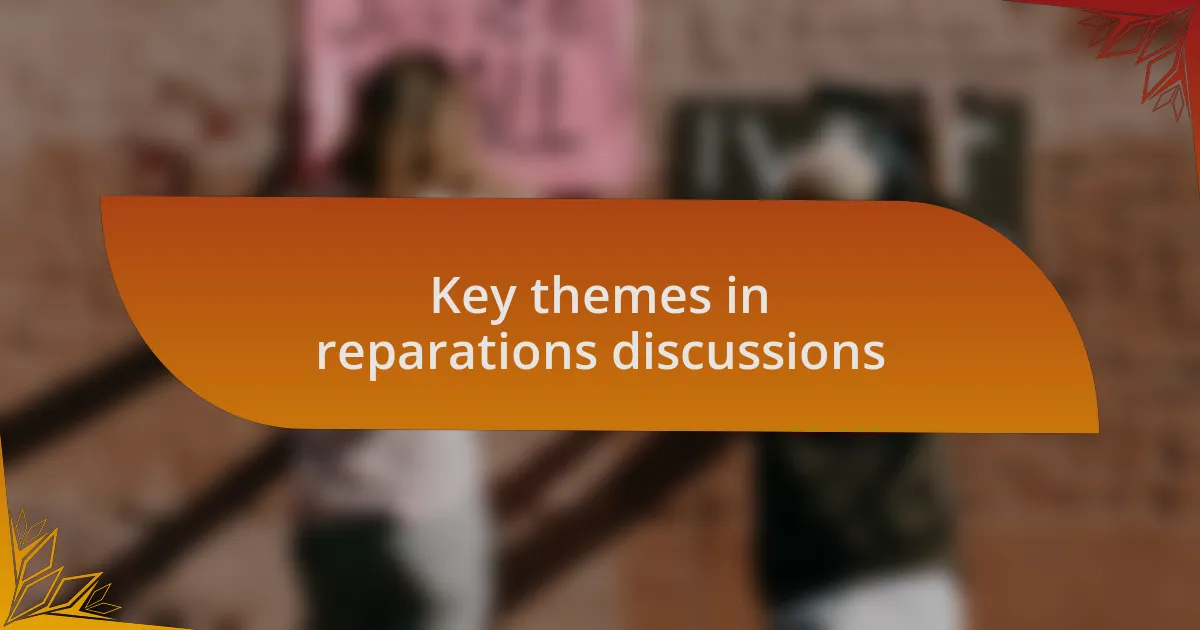
Key themes in reparations discussions
One key theme in reparations discussions is the impact of systemic injustice over generations. I vividly remember watching a documentary that traced family histories, revealing how wealth disparities and social disadvantages accumulated over time. It struck me deeply—how can we expect healing when the repercussions of historical injustices still permeate lives today?
Another crucial aspect is the notion of acknowledgment and accountability. In a recent film, I saw how communities sought recognition of their suffering before they could even consider reparations. It made me reflect: can there be true progress without a collective recognition of the past? This theme emphasizes that understanding and admitting the wrongs of history is paramount for any reparation framework to hold meaningful value.
Lastly, the narratives around reparations often touch on reparative justice versus punitive measures. I recall a conversation sparked by a documentary where activists spoke passionately about restorative practices. Their words posed an essential question: should reparations be about punishment or about rebuilding and healing? This distinction informs how we approach the larger dialogue, guiding us toward potential solutions that are compassionate yet equitable.
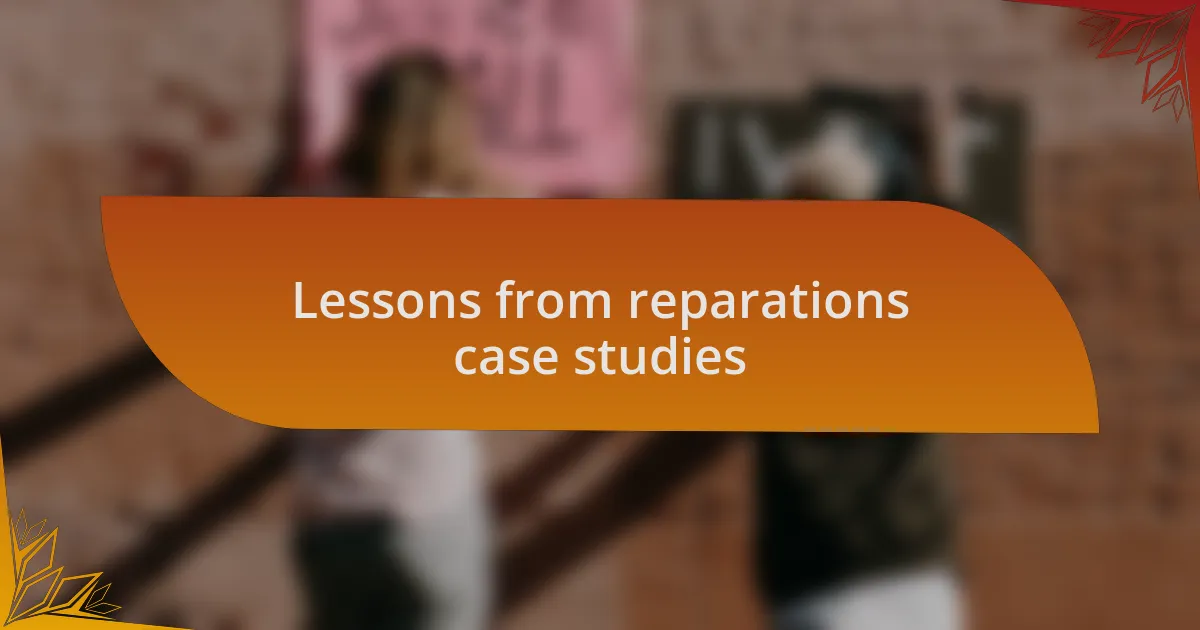
Lessons from reparations case studies
One lesson I’ve observed from various reparations case studies is the importance of grassroots mobilization. I remember watching a documentary that highlighted a small community’s efforts to highlight their historical injustices; their relentless activism not only drew national attention but also united diverse groups in their fight for recognition. This made me ponder: how often do we underestimate the power of local voices in shaping national discourse?
Another key takeaway is the necessity of inclusive dialogue. I recently viewed a case study featuring reparations discussions that included voices from affected communities, historians, and policymakers. The result was a richer understanding of the multifaceted nature of reparations. It really got me thinking: how can we create solutions that effectively address the needs of those who suffered if their voices are left out of the conversation?
Lastly, I’ve been struck by the role of creative expression in reparations advocacy. In one documentary, artists used their craft to tell stories of ancestral pain and resilience, making the concept of reparations more relatable and emotionally resonant. Isn’t it fascinating how art can bridge the gap between history and personal experience, allowing for a deeper exploration of such a complex subject?
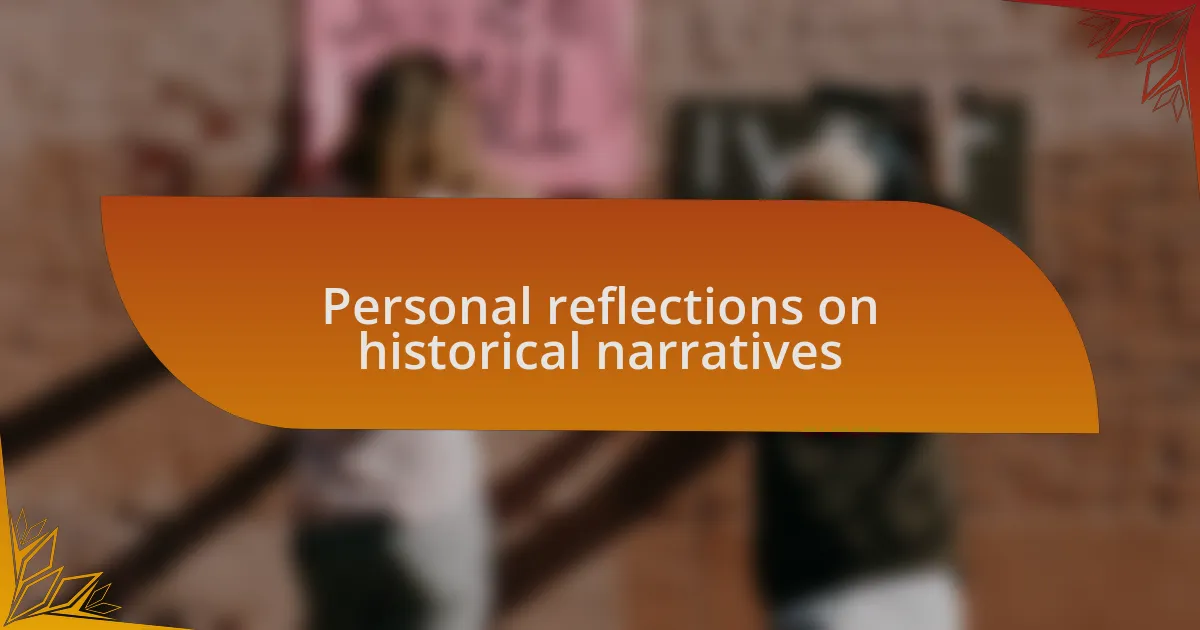
Personal reflections on historical narratives
Reflecting on historical narratives often reveals the layers of complexity behind our shared experiences. I recall a documentary that delved into the lives of individuals affected by systemic injustices, showcasing their stories through personal interviews. Watching them recount their pain and resilience made me realize that history isn’t just a collection of dates and events; it’s the living tapestry of human experiences that we must acknowledge and empathize with.
In another instance, a documentary examined the stories of communities that had been erased from mainstream history. It struck me how often we overlook these narratives, leading to a skewed understanding of our past. It begs the question: how many stories are still waiting to be told, and what impact do they hold for future generations? Engaging with these voices has opened my eyes to the importance of unearthing hidden histories to foster a more inclusive society.
Sometimes, personal reflections on historical narratives go beyond just understanding; they challenge our perceptions. I remember watching a powerful piece that juxtaposed past injustices with current events, igniting a sense of urgency within me. This connection between history and the present makes me wonder: how can we harness these insights to advocate for change today? It’s a reminder that our past shapes our future, and perhaps, the lessons learned can guide our journey toward justice and reconciliation.
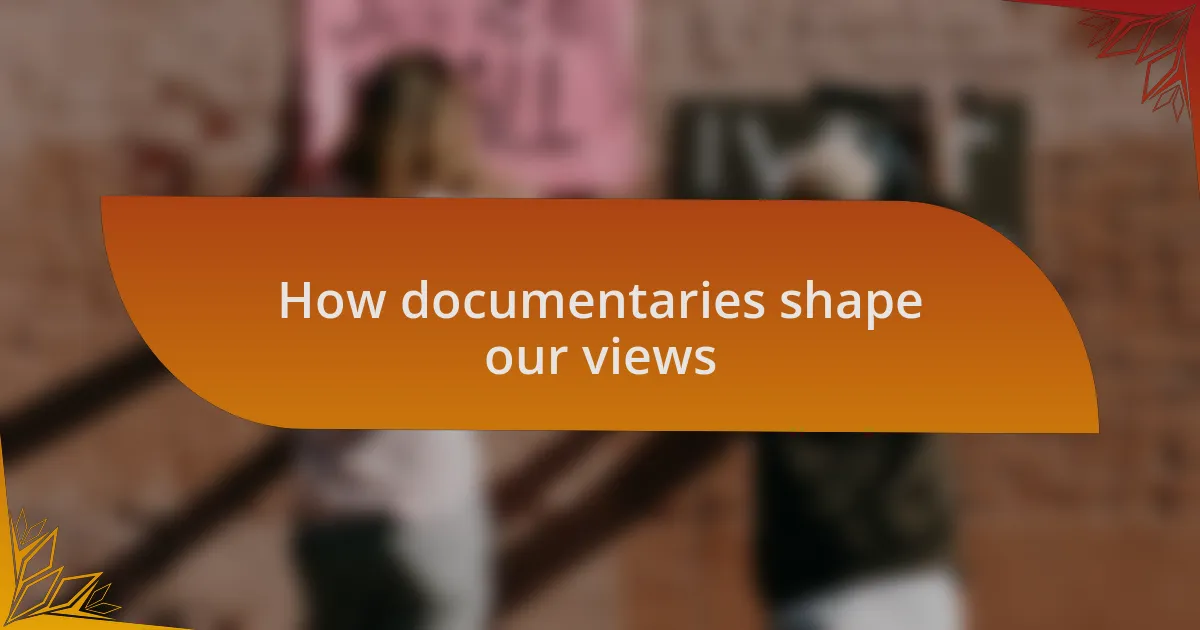
How documentaries shape our views
Documentaries have this unique ability to transform our views by putting a human face on history. When I watched a documentary that focused on the reparations movement, I felt an emotional connection to the stories of those who had fought for recognition and justice. It was powerful to see their struggles depicted visually, prompting me to ask: how could one not feel compelled to understand their plight?
In addition to creating empathy, documentaries often present complex issues in a digestible format. One experience that stuck with me was viewing a documentary on the impact of colonialism on indigenous communities. The way it illustrated both the historical context and personal experiences helped me appreciate the ongoing ramifications of these injustices. I found myself questioning my own assumptions about history and how they might influence my perspective on current political dialogues.
Moreover, I believe documentaries often serve as a catalyst for activism. I vividly remember a documentary on climate justice that spurred me to get involved in local advocacy groups. They don’t just inform; they ignite passion and urgency to act. I wonder if, like me, others have been moved to engage with issues simply because of a documentary’s storytelling power.
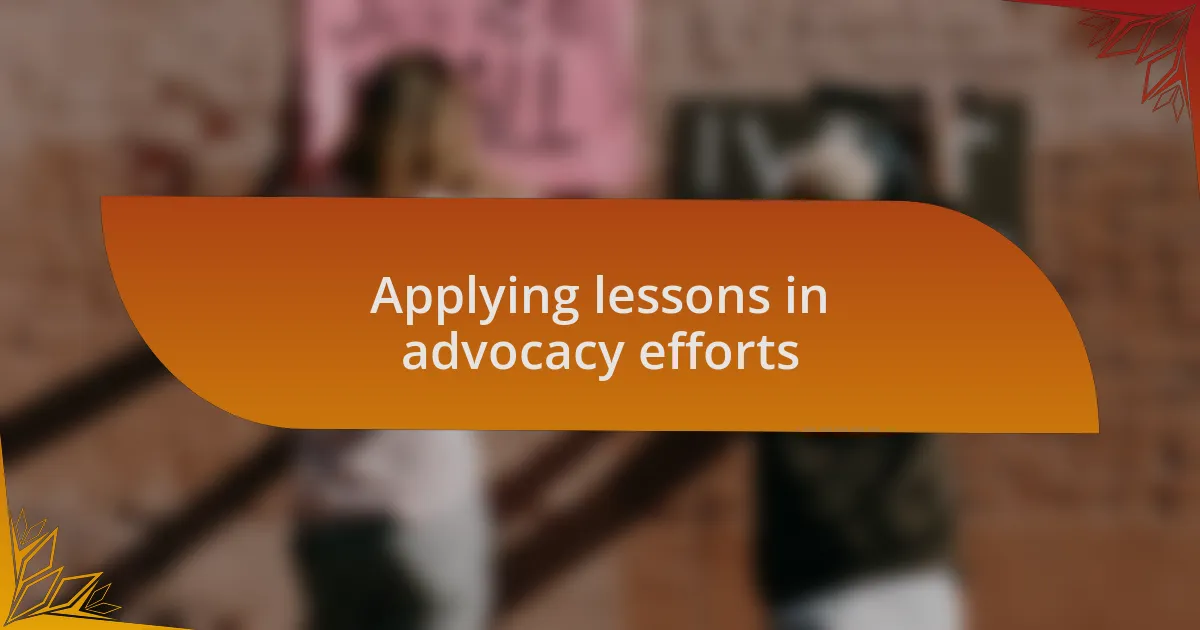
Applying lessons in advocacy efforts
Advocacy efforts can greatly benefit from the lessons learned through historical documentaries. For instance, after watching a documentary on the civil rights movement, I became aware of the importance of grassroots organizing. The footage showcased individuals coming together to fight for change, and it made me think: what could we achieve if we united our voices for reparations? This realization pushed me to engage more deeply with community groups advocating for justice today.
Additionally, I’ve discovered that storytelling is one of the most effective tools in advocacy. A documentary I viewed about the experiences of Japanese American internment during World War II highlighted not just the injustice, but also the resilience of those affected. This inspired me to share personal stories in my outreach efforts, fostering a connection that statistics alone couldn’t achieve. It made me wonder how many more hearts could be opened if we shared narratives of struggle and hope in our advocacy work.
Moreover, the visual impact of documentaries can serve to simplify complex political concepts, making them more relatable. Reflecting on my experience watching a documentary about reparations in various countries, I realized how powerful it could be to present our message visually—perhaps through infographics or public displays of art. I often ask myself: how can we leverage this medium to engage a broader audience in the reparations conversation? Seeing the power of visuals in these films ignited a desire in me to explore creative ways to enhance our advocacy initiatives.